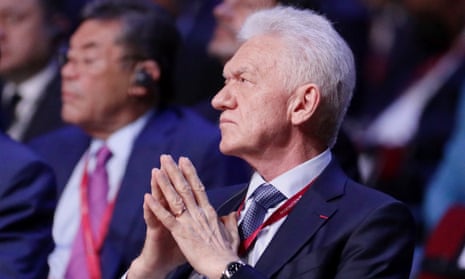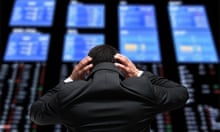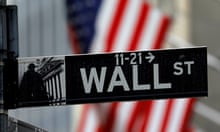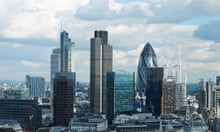As soon as Vladimir Putin ordered his forces to enter eastern Ukraine under the guise of “peacekeeping”, there was pressure on the west to fulfil its promises to punish Moscow with tough sanctions, amid fears the incursion is a precursor to a more sweeping invasion.
The US initially responded with limited sanctions targeting investment and trade related to the Russia-controlled territories of Donetsk and Luhansk, while on Tuesday Boris Johnson announced what he called the “first barrage of UK economic sanctions against Russia”.
The prime minister told the Commons that the measures, imposed on five Russian banks – Rossiya, IS Bank, General Bank, Promsvyazbank and the Black Sea Bank – and three high net worth individuals including Putin’s friend Gennady Timchenko, were just the “first tranche” and promised more. So who might be next?
‘Moscow-on-Thames’
Of all the countries that could retaliate economically, the UK has an outsized ability to inflict damage. There is thought to be more Russian gold in London than in any other city in the world. Not only in the Chelsea mansions that house the families of oligarchs, which have earned the capital the “Moscow-on-Thames” nickname, but on the London Stock Exchange (LSE).
Since the 1990s, companies whose shares are traded in Moscow have turned to London to raise money through what are known as secondary listings. They range from state-backed oil and gas producers Rosneft and Gazprom, to state-run banks VTB and Sberbank, to independent mining companies such as Nornickel that have no state ownership.
In total, 31 Russian companies are listed on the LSE, with a combined market value of £468bn, according to the data company S&P Global.
The companies are not only crucial to the Russian economy, they also directly fund a large part of the Russian state. London-listed Russian oil, gas and mining companies paid their government £39bn in taxes in 2020, according to a Guardian analysis of payments to government disclosures. That revenue is hugely important to the Putin regime: Russia spent £41.7bn on its military in 2019, 11.4% of government spending, according to the World Bank’s latest figures.

How might sanctions be imposed?
A statutory instrument laid before parliament earlier this month gave the UK government the power to impose sanctions on those “carrying on business of economic significance to the government of Russia” as well as companies supportive of the Russian government, and sectors of strategic significance, including energy, mining and financial services.
While not every Russian-linked company will be a target for sanctions, the reality is most of the London-listed companies potentially fall within the definition of having economic or strategic significance to the Russian government.
And in the US a draft sanctions bill explicitly names 12 Russian banks as potential targets for sanctions and would also give powers to hit companies in the oil and gas and mining sectors.
No companies or individuals have yet been designated, but the new legislation now allows for the speedy designation of a very broad range of individuals and entities.
Who might be targeted?
Under the most extreme scenario, companies operating in the UK, US or EU – including most of the world’s major financial institutions – could be forbidden from any transactions with sanctioned entities. That could mean the indefinite suspension of their shares, and an inability to issue new debt or shares in London.
The most obvious companies of economic significance to the Russian government, based on tax take, are Rosneft, Gazprom and Lukoil, who together paid 3.2tn roubles (£31bn) in tax and other payments to the Russian government in 2020. All three are primarily listed on the Moscow Exchange, but have secondary listings in London.
Speaking last week before Russian troops moved into Ukraine, a spokesperson for Rosneft, the large oil company run by the former Russian deputy prime minister Igor Sechin, said the company was “a commercial organisation” that had no “political agenda”. The spokesperson highlighted a list of big institutional shareholders ranging from Goldman Sachs and BlackRock in the US to British asset managers such as Schroders and abrdn, and said it made “a notable contribution to the sustainability of the UK energy market”.
Gazprom, Norsnickel and Sberbank did not comment. Lukoil and VTB did not respond to requests for comment.
Some companies with primary London listings also operate in sectors deemed by the UK government as strategically significant to Russia. The FTSE 100 steelmaker Evraz is incorporated in London but has significant operations in Russia. The company is 29% owned by Roman Abramovich, the Russian owner of Chelsea football club.
Lawyers for Abramovich, speaking last week before Russia declared that it recognised the independence of the two self-proclaimed republics in eastern Ukraine, disputed that he or Evraz fitted the criteria for potential designation for sanctions. They added: “It would be ludicrous to suggest that our client has any responsibility or influence over the behaviour of the Russian state.”
The London-based aluminium miner En+ Group (£1.1bn), which raised $1.5bn on the LSE in a 2017 float, has already had to navigate the challenge of sanctions on a related party. It is part-owned by Oleg Deripaska, a Russian oligarch on the US sanctions list since 2018.
En+ managed to escape US sanctions by reducing Deripaska’s ownership to 45% and appointing other directors in a plan devised by Greg Barker, a former UK energy minister and Conservative peer who is the company’s chair. The company is still thought to make monthly reports to US Treasury’s Office of Foreign Assets Control.
En+ declined to comment. However, Deripaska has taken legal action to challenge US sanctions. He has denied any wrongdoing and said US allegations against him were based on “false rumour and innuendo”.
Where does this leave the City?
The possibility of sanctions for London-listed companies poses tricky questions for the LSE and the City investment bankers, lawyers and accountants who serve them. Russian companies are likely to account for only a small portion of the LSE’s fee income, but it has in the past enthusiastically welcomed Russian money – even going so far as mounting a roadshow to Moscow in 2011 to drum up custom.
That mood has changed along with the geopolitics since the Crimea annexation, but Russian companies have still raised an average of $1.8bn a year on the LSE between the 2014 Crimea invasion and 2021, or £14bn in total, according to data from Dealogic.
Sanctioned companies can, depending on the details, be suspended from trading and removed from the LSE’s stock market indices – although there is little in the rules on what would happen if suspensions were to last years. The London Stock Exchange Group declined to comment.









